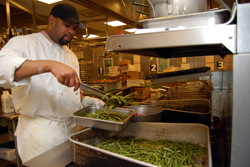- Home
- News
- Features
- Topics
- Labor
- Management
- Opinions/Blogs
- Tools & Resources
Don’t Eat Gravy While Working Graveyard – Night Shift Nutrition Tips
By Monica Reinagel, M.S., L.D./N.– According to the Bureau of Labor Statistics, more Americans are working nights than ever before.
Although some people seem to be able to adapt more easily to night shift work, humans are clearly diurnal animals, designed to be active when it’s light and to sleep when it’s dark.
Inverting this pattern appears to have a number of negative consequences. Night shift workers are more likely to suffer from insomnia, fatigue, accidents, ulcers, and even certain types of cancer than those who work during the day. People also frequently gain weight when they work the night shift.
Although it’s clearly not ideal, many people have no choice but to work nights. So, here are some tips on how to keep shift work from sabotaging your nutrition or your health.
5 Nutrition Tips for Shift Workers
1. Eat more protein, fewer carbs during your shift. Not surprisingly, night shift workers often struggle with feelings of drowsiness and making the right food choices can help.
Protein foods like tuna, eggs, string cheese, cottage cheese, peanut butter, turkey, and tofu can help increase alertness and focus, so try to incorporate these into your meals and snacks. Carbohydrate foods like bread, potatoes, and cereal, on the other hand, can have a relaxing or sedating effect-especially when eaten all by themselves, so avoid loading up on carbs during your shift.
2. Avoid sugar and sweetened beverages. Too much sugar isn’t good for anybody. But it may be even more damaging if you work the night shift.
Research shows that the body’s ability to process sugar declines at night–so my usual advice to limit your intake of added sugar and sweetened beverages goes double for night shift workers. 3. Don’t abuse caffeine. I’ve also talked in the past about the benefits of caffeine and its stimulating effect may be helpful for people who need to be awake when their bodies would normally be sleeping.
It’s fine to have a cup or two of coffee toward the beginning of your shift but don’t drink it all night long–especially if you find it difficult to fall asleep when it’s time to.
4. Don’t use food as entertainment. Night shift workers often find themselves snacking through the night out of boredom or to ‘keep their energy up,’ and this often leads to an excess of empty calories that contribute to weight gain.
Snacking isn’t a very effective way to boost your energy. Taking a break, a walk, stretching, getting some fresh air, or even taking a ten minute power nap are more effective. Raw vegetables like baby carrots, radishes, celery, and snow peas are a great way to satisfy the urge to snack; they are low in calories and high in nutrients.
5. Bring it with you. Now, of course, the $100,000 question is where you’re going to find tuna, tofu, turkey, baby carrots and snow peas in the middle of the night.
Perhaps the biggest challenge for shift workers who are trying to eat healthy is that vending machines and fast food is pretty much the only game in town. Unfortunately, in order to follow my advice, you’ll probably have to brown-bag it-but the benefits to your health and wellbeing will be well worth the extra time and effort.
List your business in the premium web directory for free This website is listed under Human Resources Directory





